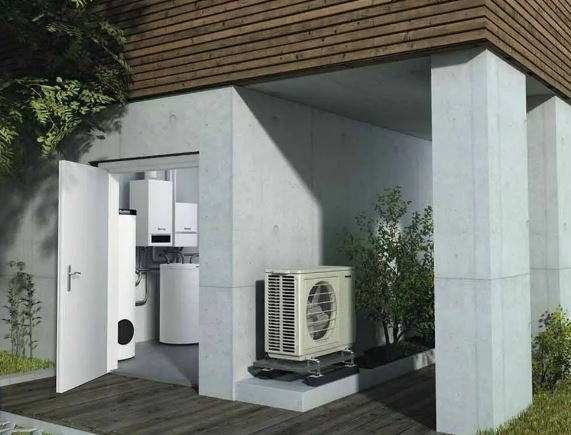Spain, like many nations worldwide, is actively pursuing stringent measures to combat climate change, with a defined target of reaching net-zero emissions by 2050. This journey necessitates a significant paradigm shift from conventional heating methodologies that primarily depend on fossil fuels such as gas, towards greener and more sustainable alternatives. Heat pumps present such an innovative solution, revolutionising home heating through their utilisation of renewable energy sources, particularly during Spain’s colder winter months.
Firstly, what is a heat pump?
What is a heat pump? – A heat pump is a device that transfers heat energy from a source of heat to what is called a heat reservoir. Heat pumps move thermal energy in the opposite direction of spontaneous heat transfer, by absorbing heat from a cold space and releasing it to a warmer one, and vice-versa. This is done through a cycle of evaporation and condensation that involves a refrigerant fluid.

The most common type of heat pumps are air-source heat pump, which transfers heat between your house and the outside air. If you’ve ever felt the blast of warm air coming from an air conditioner, you’ve experienced the basic principle of a heat pump.
In cooler months, a heat pump works by extracting heat from the outside air and transferring it indoors. Contrary to what some might expect, even cold air contains a certain amount of heat energy. The heat pump’s compressor pumps the refrigerant between two heat exchanger coils. In one coil, the refrigerant is evaporated at low pressure and absorbs heat from the environment. The refrigerant is then compressed en route to the other coil, where it condenses at high pressure. At this point, it releases the heat it absorbed earlier in the cycle.
In warmer months, the operation reverses: heat pumps can extract heat from your interior air and release it outdoors, thereby cooling the house, much like an air conditioner.
Ground-source or geothermal heat pumps and water source heat pumps achieve higher efficiencies by transferring heat between your house and the ground or a nearby water source. Although they cost more to install, geothermal heat pumps have low operating costs because they take advantage of relatively constant ground or water temperatures.
Heat pumps are energy-efficient and environmentally friendly, making them a popular choice for heating and cooling in many climates.
What are the benefits of a heat pump?
Heat pumps offer several significant advantages over traditional heating and cooling systems:
Energy Efficiency: Heat pumps are extremely efficient when it comes to energy use. Unlike conventional heating or cooling systems that generate heat, heat pumps simply move existing heat from one place to another, using a relatively small amount of electricity.
Cost Savings: Because of their high energy efficiency, heat pumps can lead to substantial savings on energy bills over time. Although the upfront installation cost might be higher than traditional systems, the long-term savings can be substantial.
Heating and Cooling Functionality: Heat pumps can both heat and cool a home, making them a versatile option for all seasons. During the summer, heat pumps can operate as an air conditioner, removing heat from the home. In the winter, they can extract heat from the outside air (or ground, in the case of geothermal pumps) and transfer it inside.
Safety: Unlike combustion-based heating systems, heat pumps don’t produce flames or hot surfaces, and they don’t create any potential for carbon monoxide poisoning.
Environmentally Friendly: Heat pumps reduce your carbon footprint. They use renewable heat from the air (or ground) and are much more environmentally friendly than fossil fuel or electric resistance heating.
Space-Saving: An air-source heat pump system does not require much space and can often be installed with minimal disruption to your property.
Long Lifespan: Heat pumps are built to last, with an average lifespan of around 15 years. They also have fewer moving parts, which can reduce the need for maintenance.
Comfort: Heat pumps provide more consistent and evenly distributed heating than traditional heating systems. They avoid the “too hot” or “too cold” air blasts common with other systems.
Government Incentives: Many governments provide financial incentives for the installation of heat pumps, recognising their environmental benefits.
It’s essential to note that the efficiency and effectiveness of a heat pump can depend on several factors, including the type of heat pump, the climate in your region, and how well-insulated your home is. In extremely cold climates, for instance, a supplementary heat source might be necessary.

As the mercury rises, it’s understandable if revamping your current heating system isn’t a top priority. Summer usually heralds a hiatus from heating needs, with the focus shifting to sun-soaked holidays and lively garden gatherings. However, it’s precisely this season of warmth that makes for an ideal period to install a heat pump.
Installation of a heat pump involves temporary disruption of your home heating, even when handled by seasoned professionals. By scheduling this during the summer months, when heating needs are minimal, you circumvent the discomfort of potentially having no heating on a frigid winter day. Although the summer months may seem an unconventional time to think about heating, it’s a proactive strategy to prepare for winter.
The summer often brings quieter periods for the heating industry, improving your chances of securing an installation slot that aligns perfectly with your schedule. Winter’s peak heating season, marked by pressing jobs and unpredictable weather, often sees resources and supply chains stretched thin.
Today’s heat pumps, thanks to continual advances in technology and engineering, can efficiently deliver substantial heat, even in severely low temperatures. They harness heat from various sources such as outdoor air, ground, or water. Air source heat pumps, requiring minimal outdoor space and offering flexible installation options, are especially in demand.
Beyond the evident environmental advantages, heat pumps can yield substantial savings on heating bills. While the upfront cost may exceed that of traditional heating systems, the long-term savings and return on investment make heat pumps a cost-effective choice. As the phase-out of gas proceeds, electricity, which powers heat pumps, could become a more economical option. Moreover, heat pumps consume less energy, leading to reduced utility bills. Government initiatives, such as the Boiler Upgrade Scheme (extended until 2028), provide further financial incentives for homeowners to make this eco-friendly transition.
This scheme offers significant discounts on the cost and installation of three low-carbon heating systems, including biomass boilers, air source heat pumps, and ground source heat pumps. Due to the scheme’s increasing popularity, interested homeowners should apply promptly to secure their vouchers before they run out.
The heat pump industry in Spain is currently witnessing a period of rapid growth and innovation. Government policies and incentives actively support the transition towards heat pumps, raising awareness and availability of skilled installers, thus bolstering the popularity of this sustainable solution.
Recently, a prominent energy and home services provider introduced its ground-breaking ‘Heat Pump Performance Promise.’ This pledge assures customers of superior performance and efficiency from their heat pump installations. Additionally, it extends beyond installation, committing to ongoing maintenance and support to ensure the long-term functionality of heat pump systems. Their ‘Warm Home Promise’ also commits to providing customers with the ‘lowest cost install.’
Before heat pump installation, it’s crucial to ensure your home has adequate insulation, double glazing, and sufficiently large radiators to maximise the system’s performance. Retrofitting older homes with sufficient insulation can enhance the system’s overall efficiency. Also, be mindful of potential noise levels associated with heat pumps and ensure proper maintenance for optimal operation.
Heat pumps, backed by technological advancements, are emerging as reliable, efficient heating solutions. By adopting this sustainable alternative to fossil fuel heating systems, you contribute to reducing your carbon footprint, saving on heating costs, and supporting the global goal of achieving net-zero emissions by 2050. We also supply and install swimming pool heaters and heat pumps.
We Supply and Install Heat Pump Systems in Malaga, Spain.
 Thank you for choosing Solares Energies, your trusted partner for sustainable and energy-efficient heating solutions in Malaga, Spain. As experts in the supply and installation of high-quality heat pumps, we’re committed to providing you with the best in comfort and efficiency, while helping you reduce your carbon footprint and energy costs.
Thank you for choosing Solares Energies, your trusted partner for sustainable and energy-efficient heating solutions in Malaga, Spain. As experts in the supply and installation of high-quality heat pumps, we’re committed to providing you with the best in comfort and efficiency, while helping you reduce your carbon footprint and energy costs.
Whether it’s your first step towards a greener home or an upgrade to your existing system, we’re with you every step of the way. Our team of dedicated and experienced professionals provides unmatched service, from the initial consultation to the installation and maintenance of your heat pump.
We believe in the power of renewable energy to transform our homes and our communities, and we are proud to contribute to Spain’s goal of achieving net-zero emissions by 2050. At Solares Energies, we’re not just installing heat pumps; we’re paving the way for a sustainable future, one home at a time.
Contact us today to learn more about how a heat pump can benefit your home. We look forward to serving you and making your home more comfortable and energy-efficient.
Solares Energies – Bringing Warmth, Savings, and Sustainability to your Home.



 Solar Panel Products & Articles
Solar Panel Products & Articles Other Products & Services
Other Products & Services


